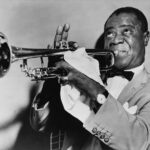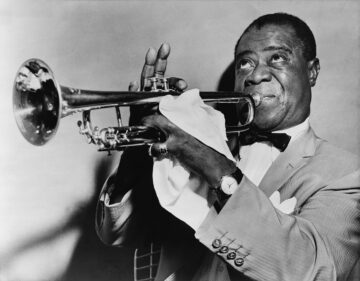

When Louis Armstrong first recorded “Hello, Dolly!”, in 1963, he “found the song trite and lifeless,” says his biographer Laurence Bergreen, a surprising fact since it became one of his signature tunes. “Armstrong had transformed the song, infusing it with irrepressible spirit and swing,” Marc Silver writes at NPR. He did so all the way to the end of his life, playing “Hello, Dolly!” after accepting an award at the National Press Club in one of his final performances on January 29, 1971. “He sang in a voice more gravelly than ever” and performed despite the fact that he “was under doctor’s orders not to break out his trumpet” after a heart attack that nearly felled the jazz giant. He died five months later on the morning of July 6th.
Armstrong spent July 5th, 1971, his final night, at home, relaxing and recording reel-to-reel tapes in his den at his home in Corona, Queens. Transferring his music to tape and making covers with his own collage art had been a decades-long hobby for Armstrong, a lifelong archivist and memoirist. “
It appears,” the Louis Armstrong House notes, “his [tape] numbering system got well into the 400s.” In 2009, Armstrong House Archivist Ricky Riccardi ran across an oddity, an unnumbered tape with no art on the cover. The only identifying information came from a note on the box in Armstrong’s wife’s Lucille’s handwriting, “Last Tape recorded by Pops. 7/5/71.”
As Riccardi explains in a post here (from a longer series on the last two years of Armstrong tapes), it would take five more years before he discovered the contents of the final Armstrong tape — an audio document of the LPs Satchmo listened to just hours before his death.
“Finally,” Riccardi writes, “around 11 a.m. on an early February day [in 2013], I was ready. I explained to my volunteer, Harvey Fisher, what was about to happen. I went into the stacks, grabbed the tape, sat at the tape deck and loaded the tape onto the hub. I hit ‘Play’ and held my breath as it started spinning.” What came out was “Listen to the Mockingbird” from Armstrong’s 1952 collaboration with Gordon Jenkins, Satchmo in Style.
“I felt tears in my eyes while dubbing it,” Riccardi writes. After recording this song, Armstrong flipped the record over, recorded the second side, then went on to record the entire 2-LP set of Satchmo at Symphony Hall, “probably with fond memories of the musicians and friends on that album who were no longer living.” Finally, Armstrong put on his first, 1956 collaboration with Ella Fitzgerald, an album, writer and musician Tom Maxwell argues, that made a “cultural leap [in] the middle of that tumultuous century, that two black performers could be considered the best interpreters of white show tunes, and that the extemporaneous heart of jazz could elevate the whole to iconic status, desegregating American popular culture in just eleven songs.”
After the final song, “Louis left his den and headed down the hallway to his bedroom,” Riccardi writes, where, Lucille says, he “was feeling frisky and tried to initiate ‘the vonce.’ She declined, fearing for his health. He went to sleep. About 5:30 in the morning of July 6, Louis Armstrong passed away in his sleep…. Can you think of a better way to go out?” It was a peaceful end to a hard life lived in devotion to spreading his musical joy. You can hear a playlist compiled by Riccardi of most of the music from Armstrong’s 1969-1971 tapes above. It starts with “Hello Dolly!” and ends with the last song on Ella and Louis, and on Armstrong’s final reel-to-reel tape, the last song he ever heard: “April in Paris.”
Related Content:
Louis Armstrong Remembers How He Survived the 1918 Flu Epidemic in New Orleans
When Louis Armstrong Stopped a Civil War in The Congo (1960)
Josh Jones is a writer and musician based in Durham, NC. Follow him at @jdmagness.
Hear Louis Armstrong’s Last Reel-to-Reel Tape, Made Hours Before His Death (1971) is a post from: Open Culture. Follow us on Facebook and Twitter, or get our Daily Email. And don't miss our big collections of Free Online Courses, Free Online Movies, Free eBooks, Free Audio Books, Free Foreign Language Lessons, and MOOCs.
from Open Culture https://ift.tt/3k6ytNZ
via Ilumina



Comments
Post a Comment